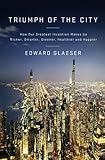-
Triumph of the City: How Our Greatest Invention Makes Us Richer, Smarter, Greener, Healthier, and…
Price $29.95Hardcover
Special Order

Edward Glaeser
discusses
Triumph of the City:
How Our Greatest Invention Makes Us Richer, Smarter, Greener, Healthier, and Happier
DateFeb
16
Wednesday
February 16, 2011 8:00 PM ET |
LocationHarvard Book Store
1256 Massachusetts Ave., Cambridge, MA 02138 |
Tickets
This event is free; no tickets are required.
|
Harvard Book Store, the Rappaport Institute for Greater Boston, and the Taubman Center for State and Local Government are pleased to welcome urban economist and Harvard professor EDWARD GLAESER as he discusses his new book, Triumph of the City: How Our Greatest Invention Makes Us Richer, Smarter, Greener, Healthier, and Happier.
America is an urban nation. More than two thirds of us live on the 3 percent of land that contains our cities. Yet cities get a bad rap: they're dirty, poor, unhealthy, crime ridden, expensive, environmentally unfriendly... Or are they?
As Edward Glaeser shows in Triumph of the City, cities are actually the healthiest, greenest, and richest (in cultural and economic terms) places to live. New Yorkers, for instance, live longer than other Americans; heart disease and cancer rates are lower in Gotham than in the nation as a whole. More than half of America's income is earned in twenty-two metropolitan areas. And city dwellers use, on average, 40 percent less energy than suburbanites.
Glaeser travels through history and around the globe to reveal the hidden workings of cities and how they bring out the best in humankind. Even the worst cities—Kinshasa, Kolkata, Lagos—confer surprising benefits on the people who flock to them, including better health and more jobs than the rural areas that surround them. Glaeser visits Bangalore and Silicon Valley, whose strangely similar histories prove how essential education is to urban success and how new technology actually encourages people to gather together physically.
He discovers why Detroit is dying while other old industrial cities—Chicago, Boston, New York—thrive. He investigates why a new house costs 350 percent more in Los Angeles than in Houston, even though building costs are only 25 percent higher in L.A. He pinpoints the single factor that most influences urban growth—January temperatures—and explains how certain chilly cities manage to defy that link. He explains how West Coast environmentalists have harmed the environment, and how struggling cities from Youngstown to New Orleans can "shrink to greatness." And he exposes the dangerous anti-urban political bias that is harming both cities and the entire country.
Walking from the Harvard Square T station: 2 minutes
As you exit the station, reverse your direction and walk east along Mass. Ave. in front of the Cambridge Savings Bank. Cross Dunster St. and proceed along Mass. Ave for three more blocks. You will pass Au Bon Pain, JP Licks, and TD Bank. Harvard Book Store is located at the corner of Mass. Ave. and Plympton St.
(617) 661-1515
info@harvard.com
Media Inquiries
mediainquiries@harvard.com
Accessibility Inquiries
access@harvard.com
Classic Totes
Tote bags and pouches
in a variety of styles,
sizes, and designs, plus mugs, bookmarks, and more!
Shipping & Pickup
We ship anywhere in the U.S. and orders of $75+ ship free via media mail!
Learn More »Noteworthy Signed Books: Join the Club!
Join our Signed First Edition Club (or give a gift subscription) for a signed book of great literary merit, delivered to you monthly.
Learn More »








